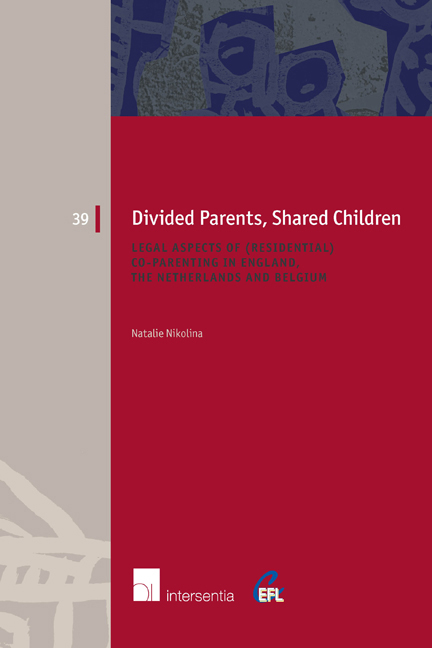 Divided Parents, Shared Children
Divided Parents, Shared Children Book contents
- Frontmatter
- Acknowledgements
- Contents
- Chapter 1 Introduction
- Chapter 2 International and European framework
- Chapter 3 The English legal system
- Chapter 4 The Dutch legal system
- Chapter 5 The Belgian legal system
- Chapter 6 Socio-psychological aspects of residential co-parenting
- Chapter 7 Comparative synthesis
- Chapter 8 Conclusions and recommendations
- References
- Samenvatting
- About the author
- European Family Law Series
Chapter 3 - The English legal system
Published online by Cambridge University Press: 12 December 2017
- Frontmatter
- Acknowledgements
- Contents
- Chapter 1 Introduction
- Chapter 2 International and European framework
- Chapter 3 The English legal system
- Chapter 4 The Dutch legal system
- Chapter 5 The Belgian legal system
- Chapter 6 Socio-psychological aspects of residential co-parenting
- Chapter 7 Comparative synthesis
- Chapter 8 Conclusions and recommendations
- References
- Samenvatting
- About the author
- European Family Law Series
Summary
HISTORY OF THE MAIN LEGAL AND SOCIETAL DEVELOPMENTS
The English law concerning children, and especially parent-child relationships, has undergone a rigorous change in the last 25 years. The most important piece of legislation that signified this change was the Children Act 1989, which came into force on 14 October 1991. Since the enactment of the Children Act 1989, English family law has become more concerned with the extend to which arrangements between parents, irrespective of their relationship to each other, meet the best interests of their child or children, while in the past the main focus used to be on the horizontal relationship between adults. It symbolises the shift in policy emphasis away from marriage and spousal relationships toward parenthood and parent-child relationships.
The Children Act 1989 introduced the term ‘parental responsibility’, before that many different terms to describe parental responsibilities and parental authority were used, often inconsistent with each other and sometimes outdated or misleading. The use of parental responsibility has been suggested by the Law Commission in preparation of the Children Act 1989.
PARENT-CHILD RELATIONSHIP
The commencement of the Children Act 1989 coincided with the rise of the Fathers’ Rights Movement. Men were becoming more vocal in their claims as fathers rather than as husbands or breadwinners. While before divorce or separation from the partner had often meant the loss of the children as well, less and less fathers were willing to accept this as the norm. This has led to the growth and establishment of UK charities such as Families Need Fathers, The Fatherhood Institute, and the civil rights group Fathers 4 Justice.
Prior to the Children Act 1989 there was a presumption that the best thing for children post parental separation was for the parent with custody to (re-)marry and to create a new nuclear family. Gradually the idea that ‘parenting across households’ was not only possible, but could be successful became more popular. Now some authors even point out the positive effects being parented in two households can have on children as it exposes them to a wider range of childhood experiences and new challenges.
- Type
- Chapter
- Information
- Divided Parents, Shared ChildrenLegal Aspects of (Residential) Co-Parenting in England, the Netherlands and Belgium, pp. 45 - 80Publisher: IntersentiaPrint publication year: 2015


